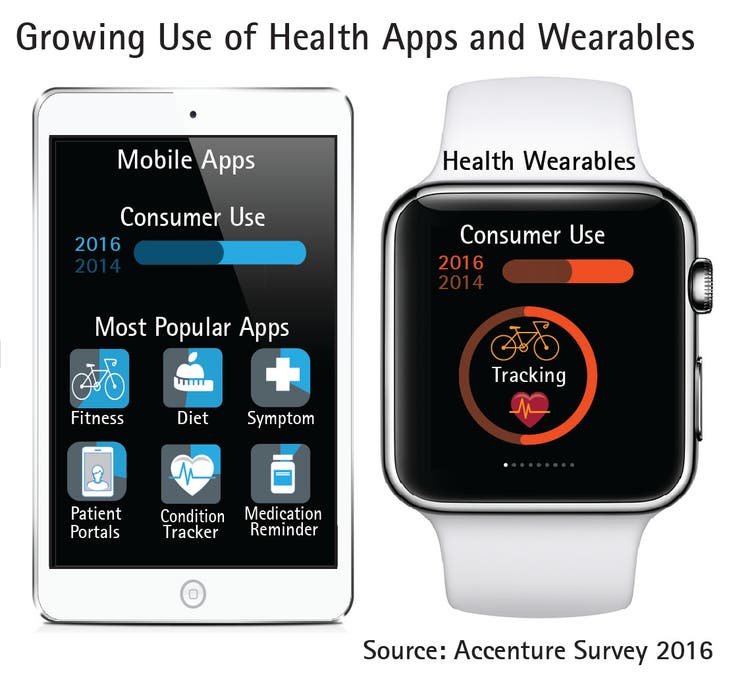March 03, 2016
Consumers’ Use of Health Apps and Wearables Doubled in Past Two Years, Accenture Survey Finds
LAS VEGAS; March 3, 2016 – The number of U.S. consumers who use wearables and mobile apps for managing their health has doubled in the past two years, according to the results of a survey by Accenture (NYSE: ACN).
Specifically, the number of consumers who use mobile health apps increased from 16 percent in 2014 to 33 percent today, and the number of consumers who use health wearables increased from 9 percent to 21 percent during the same time. The findings are part of a seven-country survey of roughly 8,000 consumers – including roughly 2,225 in the United States – with select findings compared to a similar survey of physicians.

Of the one in five consumers in the most-recent survey who were asked by a doctor to use wearables to track their health, such as fitness or vital signs, three-quarters (76 percent) followed their physician’s recommendation. The majority of consumers (77 percent) and doctors (85 percent) alike said that using wearables helps a patient engage in their health.
Four in 10 consumers (40 percent) who use health apps have discussed or shared mobile app data with their doctor in the past year. Consumers most frequently use health apps for fitness (cited by 59 percent), diet/nutrition (52 percent), symptom navigation (36 percent) and accessing their patient portal (28 percent). While the vast majority (90 percent) of consumers said they would be willing to share wearable or app data with medical providers, far fewer said they would be willing to share that data with their health plans (63 percent) or employers (31 percent).
Nearly one-third (29 percent) of consumers in the most-recent survey—compared with just under one-quarter (23 percent) in the 2014 survey – said they prefer virtual doctor appointments to face-to-face doctor appointments. However, physicians and consumers alike believe that virtual visits provide benefits for patients, such as lower costs (58 percent of consumers vs. 62 percent of doctors), convenience (52 vs. 80 percent) and timely access to care (42 vs. 49 percent)
“Digital tools are empowering patients to take charge of their health and interact with the system on their own terms,” said Kaveh Safavi, M.D., J.D., who leads Accenture’s health practice globally. “Healthcare providers will need to weave digital capabilities into the core of their business model so that it becomes embedded in everything they do.”
Methodology
Accenture commissioned a survey of roughly 8,000 consumers in seven countries to assess their adoption and attitudes toward digital health tools, electronic health records and their healthcare providers’ electronic capabilities. The seven countries represented were the United States (2,225 respondents), Australia (1,013), Brazil (1,006), England (1,009), Norway (800), Saudi Arabia (852) and Singapore (935). The survey was conducted by Nielsen between November 2015 and January 2016. Where relevant, the survey refers to select findings from a similar physician survey to compare doctor and consumer responses.
About Accenture
Accenture is a leading global professional services company, providing a broad range of services and solutions in strategy, consulting, digital, technology and operations. Combining unmatched experience and specialized skills across more than 40 industries and all business functions – underpinned by the world’s largest delivery network – Accenture works at the intersection of business and technology to help clients improve their performance and create sustainable value for their stakeholders. With approximately 373,000 people serving clients in more than 120 countries, Accenture drives innovation to improve the way the world works and lives. Visit us at www.accenture.com.
# # #
Contact:
Jenn Francis
Accenture
+ 1 630 338 6426
[email protected]